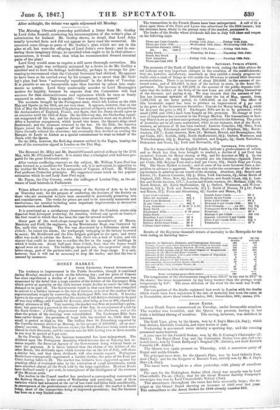The Morning Chronicle yesterday published a letter from Mr. Godley
to Lord John Russell, correcting his misconceptions of the writer's plan of colonization for Ireland. Mr. Godley shows, in detail, that Lord John totally inverted facts and did not appear to have read the memorial. He censured some things as parts of Mr. Godley's plan which are not in the plan at all, but were the offspring of Lord John's own fancy; and in cen- suring those imaginary things, he specified what ought to be in their place— unconscious, it would seem, that what he recommended formed essential parts of the plan! Lord Grey would seem to require a still more thorough correction. His speech last night was evidently animated by a desire to do Mr. Godley a mischief and to hurt his feelings individually, perhaps in revenge for pre- suming to recommend what the Colonial Secretary had shirked. He appears to have been so far carried away by his temper, as to assert that Mr. God- ley's plan had been "universally repudiated" in the debate of Tuesday. It is pitiable to see an honourable man thus hurried by spleen into state- ments so untrue. Lord Grey confessedly accedes to Lord Monteagle's motion for inquiry, because he expects that the Committee will find excuses for that obstructiveness and supineness which he once so freely censured in others. This is candid: "fore-warned, fore-armed."
The accounts brought by the Portuguese mail, which left Lisbon on the 29th May and Oporto on the 30th, are not very clear. It appears, however, that on the 21st of May the British steamer Polyphemus arrived at Oporto, with a demand from the Ambassadors of England, France, and Spain, that the Junta should agree to an armistice until the 10th of June. On the following day, the blockading squad- ron reappeared off the bar, and the Junta's three steamers went out to attack it. After a harmless engagement, which lasted two hours, the Queen's ships stood Southward; and the steamers returned to the bar. On the 25th, the America frigate joined the British squadron off the Douro. Three days afterwards, the Junta formally refused the armistice; but eventually they decided on sending the Marquis de Loule to Lisbon as a special commissioner to treat on behalf of the Junta with the Queen.
On the 29th, however, the Bull-dog steamer arrived in the Tagus, bearing the news of the convention signed in London on the 21st May.
























 Previous page
Previous page